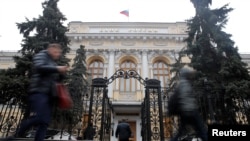For the first time since 1918, when Vladimir Lenin repudiated the debts of the former Russian Empire, Russia has defaulted on its sovereign debt. It did so by failing to make a payment of approximately $100 million in dollars and euros to bondholders.
The default came about not because Russia is short of cash — Vladimir Putin's government is profiting handsomely from the recent surge in energy prices — but because Western sanctions over the war in Ukraine have made it virtually impossible for Russia access foreign currencies in the volume required to service its debts.
The payments in question were due last month, but a 30-day grace period ended on Sunday, triggering the default. After Russia invaded Ukraine and widespread sanctions were applied to the Russian economy, the U.S. Treasury had allowed an exception to rules blocking Russia's use of international payment services to allow the Kremlin to make its debt payments. That exception expired in May.
Russia blames sanctions
Russian Finance Minister Anton Siluanov has denied that the failure to make payments is a true default. Russia has paid the equivalent amount of money, in rubles, into accounts in Russian banks opened in the names of its creditors. However, because of international sanctions on Russian banks, it will be difficult or impossible for those creditors to access the funds.
In a statement reported by Bloomberg News, Siluanov said, "Overseas counter-agents have refused to make payments in foreign currencies, which for us is a force majeure situation. And it's purely for this reason that we are switching to payments in rubles."
The term "force majeure" refers to a clause common in many contracts that frees parties from liability if forces beyond their control prevent them from fulfilling their obligations. The obligations remain in place and must be fulfilled when it becomes possible to do so.
Russia's claims seen as plausible
Mitu Gulati, a law professor at the University of Virginia who studies sovereign debt issues, told VOA that Russia's situation is unique and that the claim that its default is merely "technical" has some basis in contract law.
"I cannot recall any prior event where we have had a default on a sovereign debt that has been forced in this way," Gulati said.
He said that Russia can rely on what is known in the law as the "doctrine of impossibility and impracticability."
"The law is that, if the reason I'm not able to perform on my contract is that some external force has prevented me from performing — for example, a legal restriction, like a sanctions regime — then I'm not in default, so long as I pay when the external force is removed," he said.
Imposing costs
Gulati noted that the Biden administration appears to have made the decision to block Russia from paying its debts as a means of imposing costs on the Kremlin for its ongoing invasion of Ukraine. However, he said it's unclear that the move will have much of an effect beyond what the war has already done to Russia's international reputation.
"My inclination is to think that the markets are actually not going to penalize Russia any more for this event, because the market is going to see that Russia is desperately trying to pay," he said.
"Russia's reputation is in the mud because they have engaged in this horrible action vis-a-vis a neighbor by invading them," Gulati said. "But if we're just talking about the U.S. causing some additional penalty for Russia … I think all that this strategy is going to do is (ensure) that U.S. creditors don't get paid."
G-7 backdrop
The discussion of Russia's difficulties in paying its creditors took place against the backdrop of an ongoing meeting of the leaders of the Group of Seven leading industrialized democracies, where the topic of the war in Ukraine held center stage.
"Our goal is to support Ukraine as best we can," said German Chancellor Olaf Scholz, whose country currently holds the group's rotating presidency. "In order to do this, we must take all the decisions required – a necessity in these difficult times." In addition to the U.S. and Germany, the other members of the G-7 are Canada, the United Kingdom, France, Italy and Japan.
Among other things, the leaders discussed placing a cap on the price of Russian oil trading on global markets. The aim is to reduce the economic benefits to Russia of the huge spike in oil prices brought about by the war in Ukraine. However, it is unclear how such a restriction could be imposed.
Also discussed was a plan to ban the importation of gold from Russia. After energy products, gold is Russia's most valuable export.
Other measures announced
The White House on Monday released a fact sheet detailing other measures the G-7 will take to increase pressure on Russia. They included further sanctions on companies involved in the manufacture of military equipment needed to continue with the war effort.
The group of wealthy nations also proposed directing the income from tariffs now being collected on Russian goods to Ukraine as a means of forcing Russia to "pay for the costs of its war."
In addition, the group agreed to seek sanctions against individuals involved in human rights abuses in Ukraine, including "war crimes, profiteering, and illegitimate authorities." Those placed on the list would include members of military units credibly accused of war crimes, people involved in the theft and sale of Ukrainian grain, as well as people who have taken positions of authority, including mayors and government ministers, in regions of Ukraine occupied by Russian forces.




